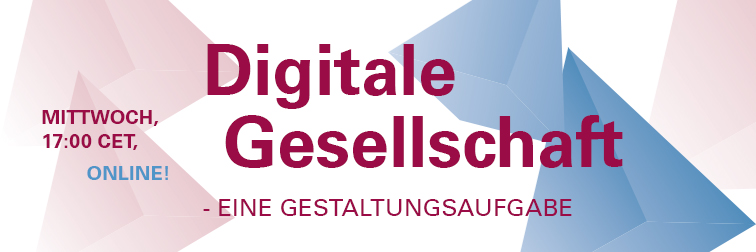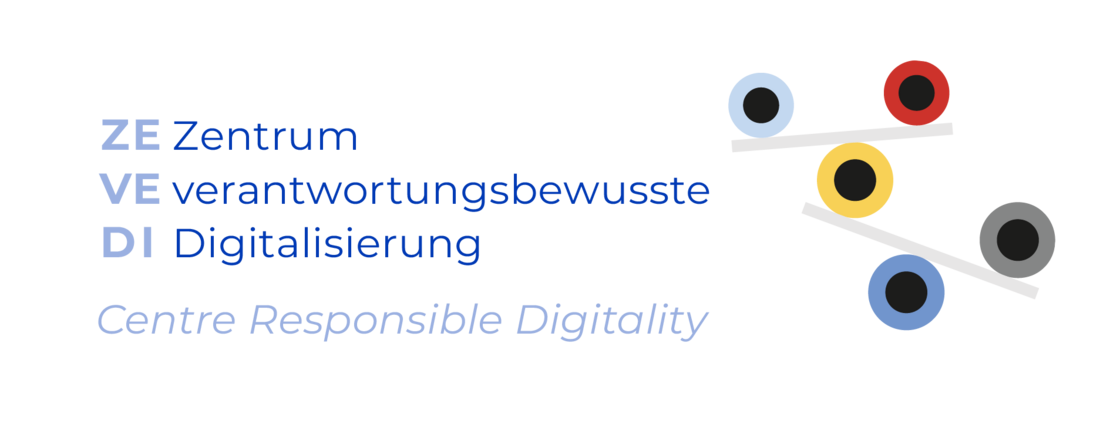ITeG Lectures 2022/2023
Wednesday, 17:00 CET
via ZOOM

Nähere Informationen zu den einzelnen Vorträgen:
Digital systems today enable freedoms that would hardly have been possible in the past. From the comfort of our sofa, we can order goods at any time of day, read the newspaper, quickly look up something in Wikipedia, be entertained in a variety of ways and share our lives with thousands of people in social media. We can communicate with each other via WhatsApp, Telegram and the like, track every step we take or have our bodily functions measured around the clock - if we want to.
But is it really that simple? To what extent can we still escape these "freedoms" - whether because we are becoming more and more dependent on such systems and services, or because something has now become possible and desirable that would not even have been conceivable in the past (such as constantly measuring ourselves in order to live healthier)? Since, moreover, the concrete design of these "freedoms" is rarely (co-)determined by oneself, the question of what self-determination might mean in this context suggests itself. The lecture therefore proposes a concept of "digital self-determination" that is tied back to general philosophical considerations of self-determination and identifies seven components of digital self-determination (competence, informedness, values, choice, voluntariness, volition, and action). In addition to the limits of the concept, exemplary possibilities of empirical operationalization are also addressed.
Marcel Mertz Marcel Mertz studied philosophy and sociology at the University of Basel and received his doctorate in philosophy at the University of Mannheim. His research interest is the methodology of bioethical research, e.g. empirical ethics, systematic reviews of normative literature and ethical evaluation methods in Health Technology Assessment (HTA). Besides the methodological work, he mainly works on topics related to research ethics, ethics of translational research and animal experiment ethics.
Platforms set rules, platforms enforce those rules (including through algorithmic systems), and platforms sit in judgment on the application of those rules. Their power, however, is generally not subject to "checks and balances." How is this seemingly pre-modern disposition of rights and obligations to be legitimized? Ways are beginning to emerge to compensate for the legitimacy deficits of the online order. These can either amount to increasing civil society's influence on platform governance through transparency, consultation, and participation. The other approach seeks to provide a rule-of-law response and subject platform governance to the same rule-of-law principles. Against this backdrop, the lecture analyzes recent "parliamentarization" tendencies of platform governance: a large social network has established an oversight board to help with content decisions and algorithmic recommendations. The same social network is experimenting with deliberative processes at scale. A game label is experimenting with player councils to help programmers make exciting game design decisions. The advisory board of German public television wants to set up a citizens' panel to have more influence on programming decisions; and the world's largest online knowledge platform has been letting users (and user-editors) decide on content conflicts since its inception. Can platforms learn democracy here?
Matthias C. Kettemannis University Professor for Innovation, Theory and Philosophy of Law at the Institute for Theory and Future of Law. After studying law in Graz, Geneva and as a Fulbright and Boas scholar at Harvard, he completed his doctorate with a thesis on the legal status of the individual in international law with Prof. Benedek in Graz. In 2014, he was called to the Cluster of Excellence "The Formation of Normative Orders" at the Goethe University Frankfurt as a postdoctoral fellow, where he habilitated with Prof. Kadelbach and Prof. Vesting at the Institute of Public Law of the Goethe University Frankfurt am Main with a thesis on the normative order of the internet and received the authorisation to teach international law, internet law and legal theory. In the winter semester 2019/2020, he held the Chair of Public Law, International Law and Human Rights and the Hengstberger Professorship for Basic and Future Issues of the Rule of Law at the Institute for Constitutional Law, Constitutional Theory and Philosophy of Law at the Ruprecht-Karls-Universität Heidelberg, and from the summer semester 2020 to the summer semester 2021, he held the Chair of International Law at the Friedrich-Schiller-Universität in Jena.
In addition to his professorship, Prof. Kettemann is research programme leader of the research programme "Regulatory Structures and Rule Formation in Digital Communication Spaces" and senior researcher at the Leibniz Institute for Media Research | Hans Bredow Institute, Hamburg; research group leader "Global Constitutionalism and the Internet" and head of the research project "International Law of the Net" at the Alexander von Humboldt Institute for Internet and Society, Berlin; Head of Section, "International Law and the Internet" at the Max Planck Institute for Comparative Public Law and International Law; and Member of the Board and Research Group Leader "Platform and Content Governance" at the Sustainable Computing Lab, Vienna University of Economics and Business.
Today's society in Western Europe is facing two movements: On the one hand, an increasingly progressive technologically-induced change, essentially brought about by digital business models - digitization for short - and, on the other hand, a population demography in which every third person will be over 65 in 2050. Added to this is the fact that older people are usually not the ones who are best able to keep up with digitization - especially in terms of its speed; they have the highest non-liner rate among all population strata and are the most likely to reject newer technologies. However, the question of why this is so, and how it can be changed in terms of digital participation and digital diversity, has hardly been researched in business informatics. The presentation will therefore give a theoretical classification of the complex of topics around IT-based stereotype effects and show design-theoretically which possibilities exist to let older people participate in digitalization in order to be able to act digitally autonomous and self-responsible.
Julia Krönung is a university professor for business administration, in particular the design of socio-technical information systems, at the FernUniversität Hagen. She received her PhD from Goethe University Frankfurt and was an assistant professor for e-business and e-government at the University of Mannheim from 2014-2019, as well as a professor for business informatics at EBS Universität für Wirtschaft und Recht from 2019-2022. Her research interests include socio-technical system design, IT acceptance, and digital diversity. In her research projects (funded by BMBF, Carl-Zeiss-Stiftung), she also looks at advancing digitization from the perspective of disadvantaged user groups (e.g., young women or senior citizens). She is author/co-author of numerous research articles published in the Journal of the Association of Information Systems, Journal of Business Ethics and Information&Management, among others.
In current discussions, one often hears that artificial intelligence could have "bias", that the use of AI could lead to "discrimination". Even laws and draft laws such as the GDPR and the draft AI Regulation mention these risks and aim to mitigate them. But what do we actually mean when we talk about "algorithmic bias" (and the like), and what can computer scientists and other stakeholders do about it? In this talk, I will use already observed and (somewhat) fictional examples and an interdisciplinary perspective to show how AI and other technology can systematically disadvantage people. I present structural patterns of discrimination and outline principles of countermeasures. In doing so, it turns out that many of the apparently "new" problems that are so "technology-driven" are already familiar "old problems" and that human and machine decisions are intertwined. Finally, I provide a perspective on how such an understanding can also help use technology to reduce discrimination and disadvantage.
This talk is organized in cooperation with the project group "Responsible Algorithmic Decision Making in the Workplace" of the Hessian Center Responsible Digitality (ZEVEDI).
Bettina Berendt is Professor of Internet and Society at Technische Universität Berlin since 2019, Director of the Weizenbaum Institute, and Visiting Professor at KU Leuven, Belgium. Her current research includes Data Science and Critical Data Science, especially regarding privacy/data protection, discrimination and fairness, and AI and ethics, with a focus on textual and web-related data. Until 2019, Bettina Berendt was a professor at the Department of Computer Science / Declarative Languages and Artificial Intelligence Research Group at KU Leuven, and previously an assistant professor at the Institute of Information Systems at Humboldt-Universität zu Berlin. Details on publications, talks, projects, positions, courses, and other activities can be found at www.berendt.de/bettina.






